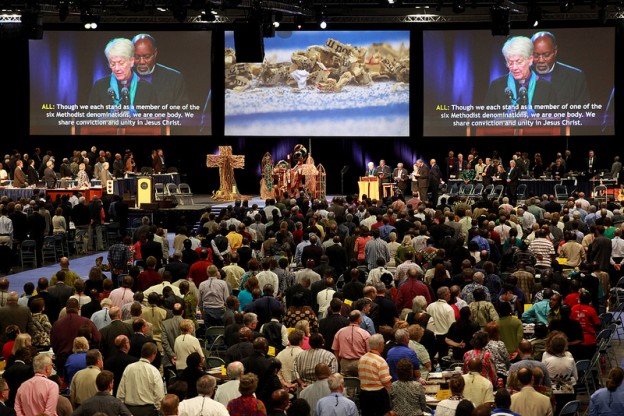

Those darn Methodists
There was an editorial in the Strib a couple of days ago commending the Minnesota Conference of the United Methodist Church on bucking the recent General Conference of the church on the issue of gay marriage, calling it a “brave stand.” The Minnesota Conference did indeed, as the piece suggests, vote to oppose the anti-gay marriage amendment slated to be on the ballot in Minnesota this November:
But last week’s 400-169 vote [of the Minnesota Conference] to oppose the marriage amendment by the policymaking body of Minnesota’s United Methodists stands in marked contrast to the more conservative stance of their denomination. The United Methodist Book of Discipline says “the practice of homosexuality is incompatible with Christian teaching.”
But a little explanation is in order. The General Conference meets once every four years; it met in Tampa this spring. The United Methodist Church is a worldwide church; delegates to the Conference come from around the globe. It is a democratic institution, and the issues of the ordination of gay clergy and gay marriage have been contentious at recent Conventions. Efforts to change the Book of Discipline to be accepting of people with a same sex orientation have been rebuffed. But people have, and will continue, I am sure, to persevere in their efforts.
Parenthetically, a word about Methodists and the “Book of Discipline” is also in order. While he was a fellow at Oxford, a group of “fellows” there, including John Wesley, the founder of the Methodist Church, were so dedicated to their pursuit of the Christian life that other students began to call them “Methodists”:
The year of his return to Oxford (1729) [after a couple of years at his father’s church] marks the beginning of the rise of Methodism. The Holy Club was formed by John’s younger brother, Charles Wesley [along with Issac Watts, among England’s best hymn writers], and some fellow students, including George Whitefield. The holy club met weekly and they systematically set about living a holy life. They were branded as “Methodist” by students at Oxford who derided the methodical way they ordered their lives.
The name obviously stuck. Methodists were heavily involved in the abolitionist movements in England and the United States, and most other causes for social justice through the years that you can name.
And the Book of Discipline is not a crack ‘em over the head to make ‘em stay in line kind of a tome, but rather a way of expressing a methodical (there’s that word, again) approach to a “holy” life. Here are Wesley’s words from which the Book of Discipline springs:
It is therefore expected of all who continue therein that they should continue to evidence their desire of salvation,
First: By doing no harm, by avoiding evil of every kind . . . ;
Second: By . . . doing good of every possible sort, and, as far as possible, to all . . . ;
Third: By attending upon all the ordinances of God
This is the foundation of the social activism of the Methodist Church. An opinion writer at the Strib – and many of you will know who I am talking about – has criticized the United Methodist Church on multiple occasions for paying too much attention to the temporal and not the spiritual. But it is one of the most admirable things about the Methodists.
John Wesley had his disagreements with the Anglican Church, of which he was a member, too, about a variety of issues, the ordination of clergy and his methods of evangelism, among them.
But, back to cases, so to speak. The Episcopal Church split over the issue of the ordination of gay clergy. I doubt that will happen to the Methodists. There are members of the church, however, who will continue to push this issue, both in Minnesota, and with the larger church organization.
And sure enough, the Methodists are in the thick of the organizing against the amendment in Minnesota:
More than 100 Minnesota religious leaders convened Thursday to begin their campaign to defeat the proposed constitutional amendment to ban same-sex marriage. Leaders from dozens of churches and synagogues gathered at Hennepin Avenue United Methodist Church in Minneapolis to discuss how to conduct conversations with congregants in coming months.
For many of us – and yes, I’m one of them – it isn’t really a matter of “bravery,” but simple adherence to the principle of justice and to the foundational words of John Wesley.
Thanks for your feedback. If we like what you have to say, it may appear in a future post of reader reactions.

